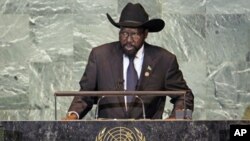South Sudan's President Salva Kiir says his troops will remain in the disputed area of Heglig, raising fears that the country and northern neighbor Sudan are moving ever closer to war. The president addressed parliament Thursday.
Speaking to lawmakers, Kiir said that after recently marching into Heglig and withdrawing, the southern army, the SPLA, was now there to stay after pushing back Sudan President Omar al-Bashir’s forces on Tuesday.
“The other time when SPLA forces went in, we had ordered their withdrawal, because this is a contested area, and we don’t want to take it by force," said Kiir. "It is Bashir that believes in military force. We’ve always believed that everything can be resolved by peaceful means. This time, I said I would not order the forces to withdraw.”
South Sudan seceded from the north in July after decades of civil war, but the two nations are still at loggerheads over multiple issues.
African Union-led negotiations over the past eight months have failed to find a deal on how to share huge oil revenues, demarcate the border, and divide the contested, oil-producing Abyei region.
South Sudan inherited 75 percent of the crude oil at independence, but shut down production in late January after accusing Sudan of “stealing” the oil. The north said it was taking “payment in kind” when the south would not pay transit fees for using its pipeline and port.
The African Union and United Nations have urged South Sudan to withdraw from Heglig, which processes all of Sudan’s remaining oil and produces half of it.
But in addition to rejecting that demand, President Kiir said he told U.N. Secretary-General Ban Ki-Moon on Wednesday that he might send southern troops into Abyei, which Sudanese forces occupied nearly a year ago.
“Bashir occupied Abyei, and is still there up to today. I told the secretary-general that if you are not moving out this force of Bashir, we are going to reconsider our position and we are going back to Abyei," he said.
Almost a fortnight after the two armies clashed in disputed border areas, on Wednesday Sudan broke off talks with South Sudan and talked of war and of mobilizing against the South.
President Kiir said that South Sudan did not want another war, but would protect itself for as long as the north took this stance.
“I always see that we will not take the people back to war," said Kiir. "If we are aggressed the way it is now coming, we have the right to fight on self-defense. We are not now making this move not because we do not know that we can do it. But still we have a hope that the authorities in Khartoum will come to their senses and will call down their mobilization, not to attack South Sudan.”
South Sudan has complained that Sudan has bombed its territory since November and accuses the north of wanting to draw it back to war.
On Thursday, it said that Sudan dropped at least five bombs on Bentiu, the state capital of Unity state and the nearest big town to the frontline.
Kiir said that over 60 bombs have been dropped in Unity state, and Thursday’s blast killed one soldier.
The bombing marks the first attack on a major town since the end of the 2005 civil war, and has further ratcheted up tensions.
News
South Sudan Refuses Border Town Withdrawal




